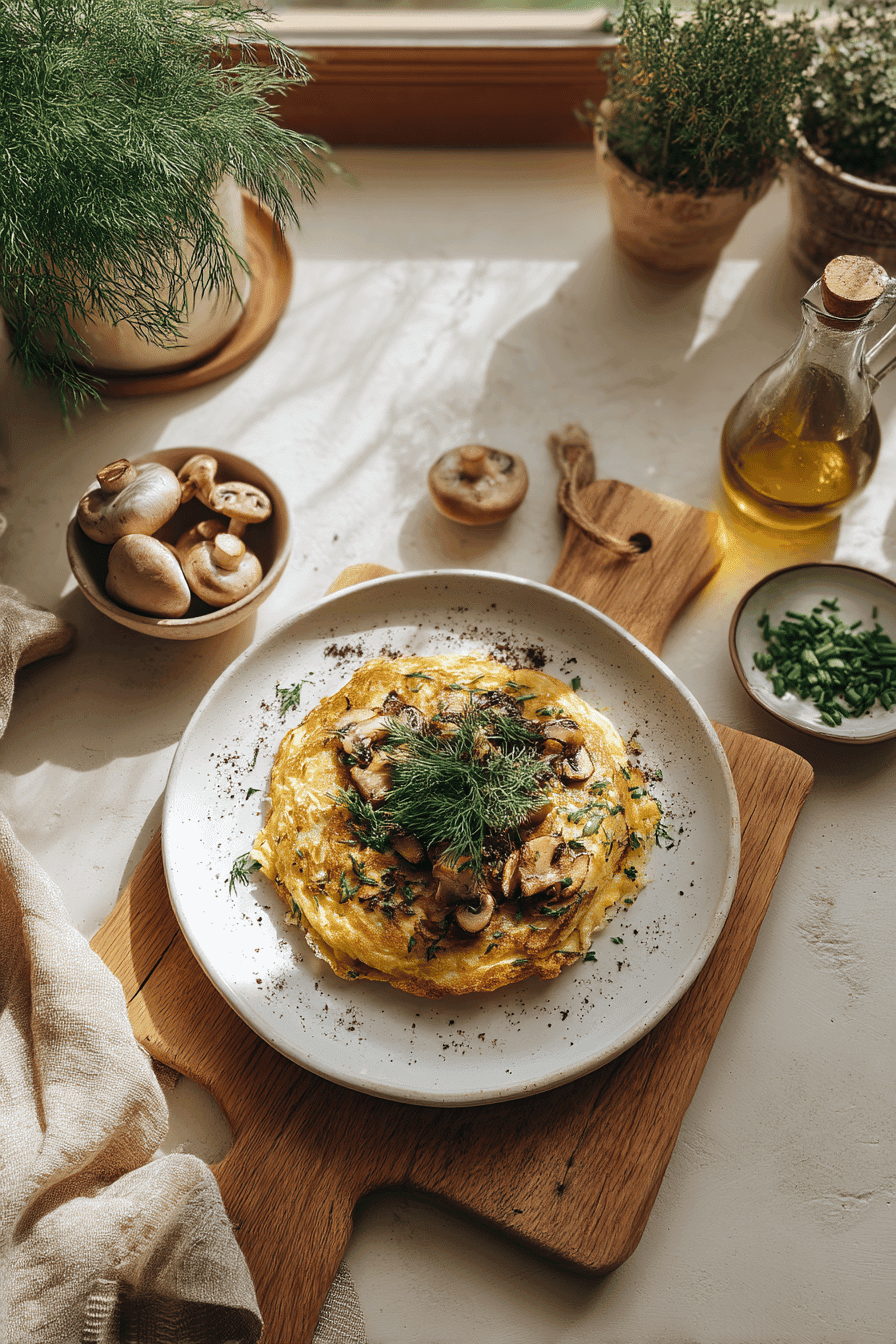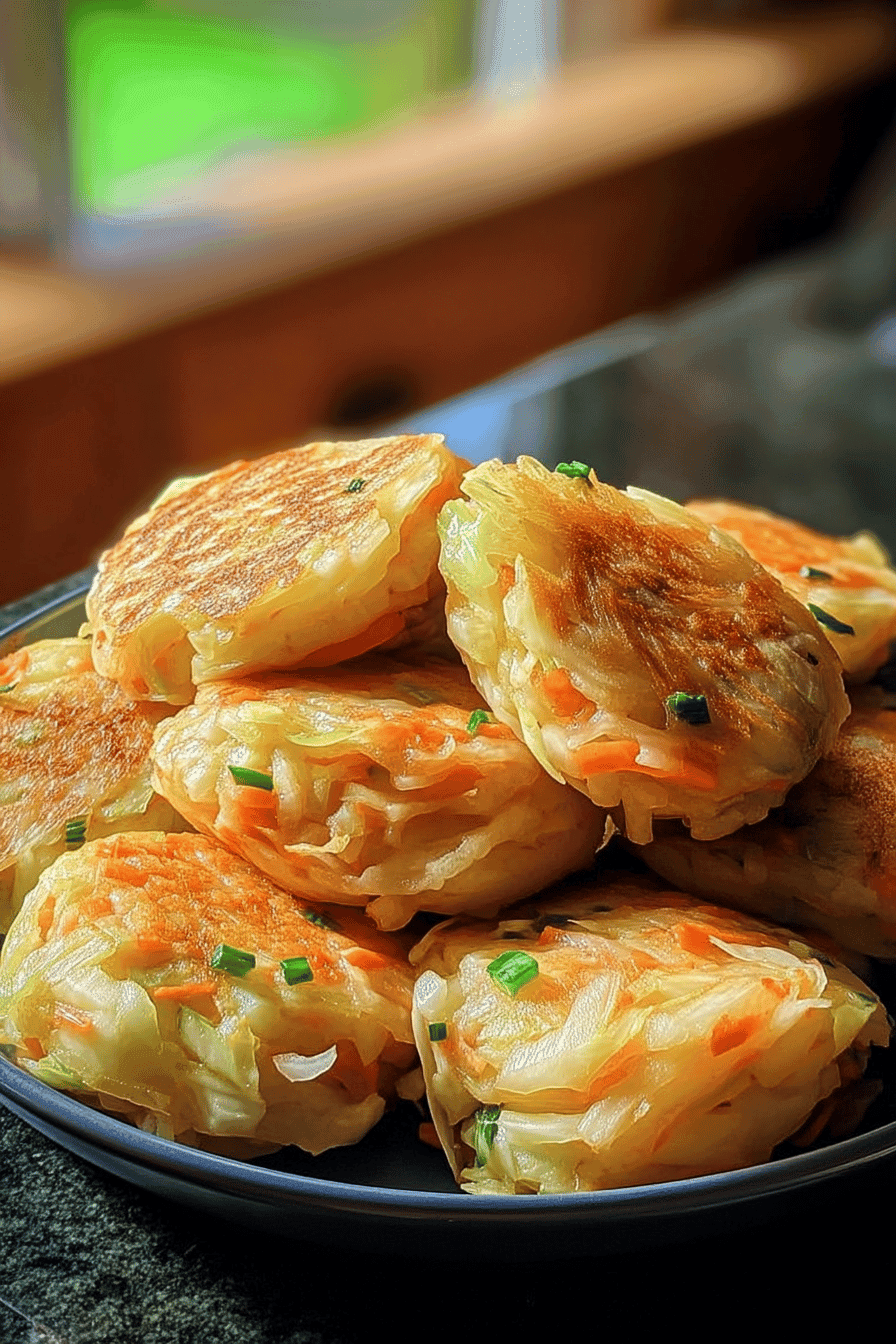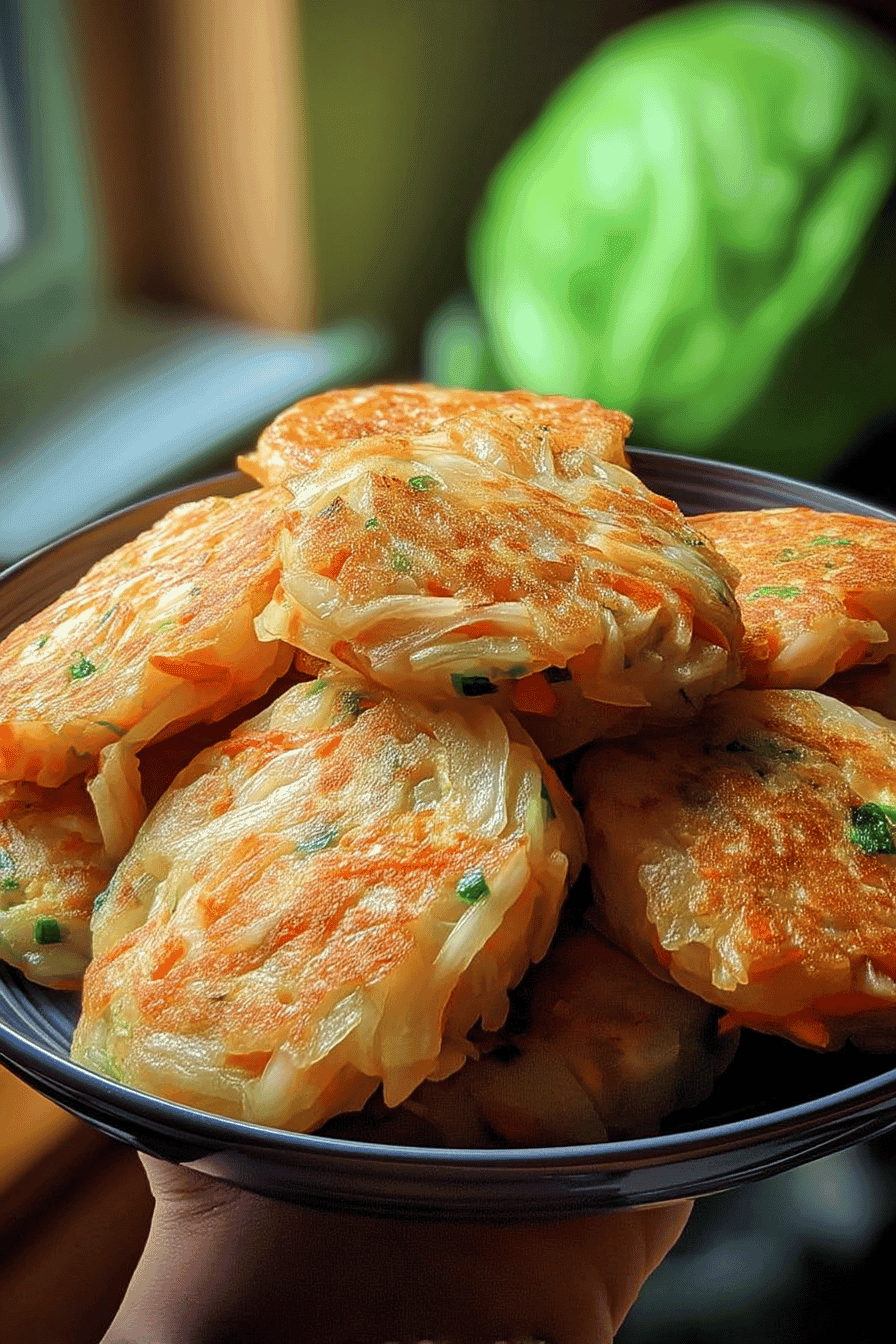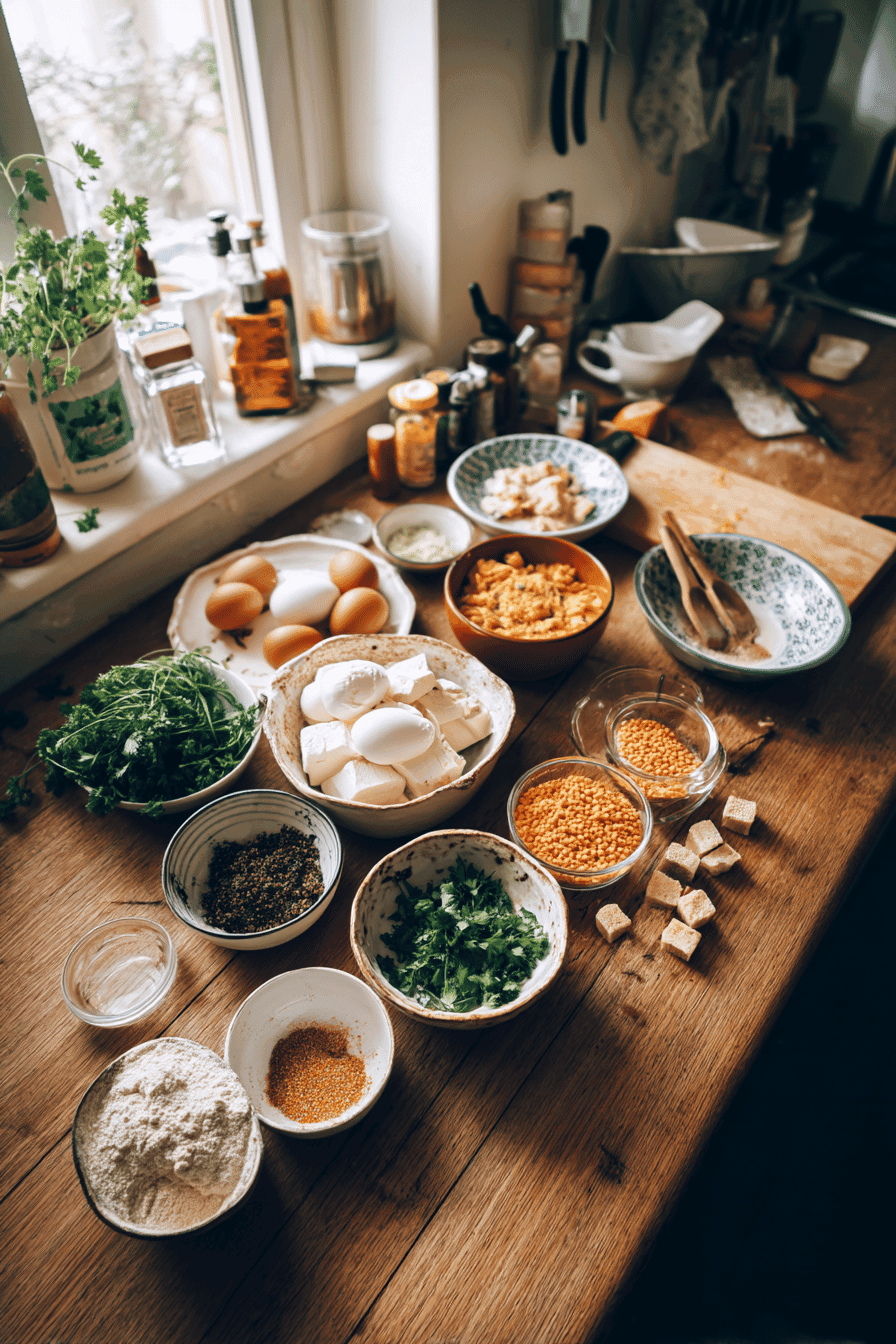Benefits and Advantages of Cabbage Eggs
Cabbage eggs combine simplicity and nutrition, making this recipe a fantastic choice for a light, wholesome meal. Easy to prepare with minimal ingredients, it suits cooks of all skill levels. The dish offers a balanced composition: cabbage supplies dietary fiber and essential vitamins like Vitamin C and A, supporting digestion and immunity, while eggs provide high-quality protein to help maintain muscle and energy levels throughout the day.
Low in calories yet rich in nutrients, cabbage eggs are ideal for those seeking a meal that aids weight management and overall wellness. The recipe’s versatility shines through its adaptability to various herbs, seasonings, and side dishes, fitting breakfast, lunch, or dinner effortlessly.
“This adaptable dish not only nourishes but also satisfies with its delightful texture and fresh flavors, making it a great staple for a balanced diet.”
- Simple and quick to prepare with common pantry ingredients
- Produces a hearty meal with low calorie count and rich fiber content
- Supports muscle repair and satiety through egg protein
- Easy to customize to different taste preferences and dietary needs
- Perfect for any meal of the day – breakfast, lunch, or dinner
Jump To
- 1. Benefits and Advantages of Cabbage Eggs
- 2. Essential Ingredients for Cabbage Eggs
- 3. Dietary Substitutions to Customize Your Cabbage Eggs
- 4. How to Prepare the Perfect Cabbage Eggs: Step-by-Step Guide
- 5. Advanced Tips and Variations
- 6. How to Store Cabbage Eggs: Best Practices
- 7. Nutritional Value of Cabbage Eggs
- 8. FAQs: Frequently Asked Questions About Cabbage Eggs
- 9. Easy and Tasty Cabbage and Eggs Recipe for a Light Meal
Essential Ingredients for Cabbage Eggs
To create the authentic and flavorful cabbage eggs dish, gather the following ingredients with their precise measurements for best results:
- 8 ounces (about 1 cup) finely shredded cabbage (green or purple)
- 2 large eggs
- ⅛ cup chopped fresh dill (optional; can be replaced with parsley or cilantro)
- ⅓ teaspoon salt, or to taste
- ¼ cup all-purpose flour (gluten-free flour can be used, note texture differences)
- 1 tablespoon oil (grapeseed, olive oil, or a combination with butter)
- Optional: 1 minced garlic clove for enhanced flavor
| Ingredient | Quantity | Role in Recipe |
|---|---|---|
| Shredded cabbage | 8 oz (about 1 cup) | Fiber-rich base |
| Eggs | 2 large | Protein binder |
| Fresh dill | ⅛ cup (optional) | Herbaceous flavor |
| Salt | ⅓ tsp (or to taste) | Seasoning |
| All-purpose flour | ¼ cup | Binding agent |
| Oil | 1 tbsp | For cooking and flavor |
| Minced garlic | 1 clove (optional) | Aromatic enhancer |
Dietary Substitutions to Customize Your Cabbage Eggs
This recipe’s flexibility allows for multiple substitutions to fit various dietary preferences or ingredient availability.
Vegan Alternatives
- Swap eggs for chickpea flour batter or blended silken tofu to maintain structure and protein content.
Gluten-Free Adaptations
- Use gluten-free flour instead of all-purpose flour to keep the recipe gluten-free, bearing in mind slight texture changes.
Reduced-Calorie Options
- Replace oil with a low-calorie cooking spray or use less oil during cooking to reduce fat intake.
Protein Boosts and Flavor Enhancements
- Add cooked lentils, tempeh, or nutritional yeast to increase protein and add savory depth without dairy.
- Use alternative herbs like parsley, cilantro, or chives to vary the aroma and freshness.
“The recipe remains delicious and nutritious with these adjustments, ensuring accessibility to a wide range of dietary needs.”
How to Prepare the Perfect Cabbage Eggs: Step-by-Step Guide
Follow this clear process to make flavorful cabbage eggs that balance nutrition and taste perfectly.
Step 1: Prepare the Cabbage and Aromatics
Wash and finely shred 8 ounces of fresh cabbage. If using, mince one garlic clove and chop fresh dill or your preferred herb.
Step 2: Mix the Base Ingredients
In a mixing bowl, combine the shredded cabbage, 2 beaten eggs, chopped dill, ¼ cup of flour, and ⅓ teaspoon salt. Stir well until all ingredients form a uniform batter-like mixture.
Step 3: Heat the Pan
Warm 1 tablespoon of oil (or a blend of oil and butter) over medium heat in a non-stick skillet. If using garlic, sauté it for 20 to 30 seconds until fragrant before proceeding.
Step 4: Cook the Pancake
Pour the cabbage mixture evenly into the skillet, spreading to about ¾ to 1 inch thick. Cover with a lid and cook for 5 to 7 minutes, or until the bottom is golden brown.
Step 5: Flip and Finish
Carefully flip the pancake using a spatula or plate to help turn it. Cook for an additional 5 to 7 minutes until the other side is golden and the pancake is cooked through.
Step 6: Serve
Remove the pancake from the pan and place it on paper towels to absorb excess oil. Serve immediately, garnishing with fresh herbs if desired.
| Step | Action | Estimated Time |
|---|---|---|
| 1 | Shred cabbage and chop herbs | 3-5 minutes |
| 2 | Mix cabbage, eggs, herbs, flour, and salt | 2-3 minutes |
| 3 | Heat oil and sauté garlic (optional) | 30 seconds |
| 4 | Cook cabbage pancake bottom covered | 5-7 minutes |
| 5 | Flip and cook other side until golden | 5-7 minutes |
Enjoy your delicious and nutritious cabbage eggs with this straightforward method. For related recipes that pair well with wholesome breakfasts and brunch options, visit our Ultimate Breakfast Pizza recipe.

Advanced Tips and Variations
To get the most out of your cabbage eggs pancake, here are some useful tips and flavorful variations:
- Non-stick pan is key: Using a good non-stick skillet helps prevent sticking and breaking when flipping the pancake.
- Fresh herbs: Fresh dill is highly recommended for its bright flavor, but parsley or cilantro can be great alternatives.
- Flavor boosts: Incorporate minced garlic sautéed briefly in oil before cooking the pancake for richer aroma.
- Spices: Add black pepper, white pepper, or a pinch of red pepper flakes for gentle heat.
- Umami enhancements: Substitute some salt with soy sauce or Worcestershire sauce to deepen flavor complexity.
- Additional ingredients: Mix in sautéed mushrooms, onions, or chopped chives for extra texture and taste.
- Oil combinations: Use a blend of olive oil and butter or grapeseed oil for enhanced flavor and healthy fats.
- Meal timing: This dish works well for breakfast, lunch, or dinner and pairs nicely with grains like quinoa or rice, or even as a filling for breakfast tacos.
- Reheating: Leftover cabbage eggs reheat beautifully in the microwave or on the stovetop.
“Experiment with these simple variations to find your favorite flavor profile and texture while keeping the wholesome essence of cabbage eggs.”
How to Store Cabbage Eggs: Best Practices
Proper storage is important to maintain the freshness and texture of your cooked cabbage eggs. Follow these best practices:
- Refrigerate: After cooking, let the cabbage eggs cool to room temperature. Store them in an airtight container and refrigerate for up to 3–5 days.
- Freeze: For longer storage, portion the pancakes and wrap each layer with parchment paper, then place them in freezer-safe containers or bags. Frozen cabbage eggs keep well for up to 3 months.
- Thawing: Thaw frozen portions overnight in the refrigerator for best results.
- Reheating: Warm gently in a microwave or on the stovetop over low heat. Stir occasionally to maintain moisture and prevent drying out.
| Method | Storage Duration | Tips |
|---|---|---|
| Refrigeration | 3–5 days | Use airtight containers; cool before sealing |
| Freezing | Up to 3 months | Portion with parchment paper between layers; thaw overnight |
Following these methods will keep your cabbage eggs fresh and flavorful, ready for quick meals on busy days.
Nutritional Value of Cabbage Eggs
Cabbage eggs offer a nutritious and balanced meal option with a variety of health benefits. Below is a breakdown of the key nutritional aspects per serving (about half the recipe):
| Nutrient | Approximate Amount | Health Benefit |
|---|---|---|
| Calories | 215 kcal | Provides sustained energy |
| Protein | 9 grams | Supports muscle repair and satiety |
| Fat | 12 grams (including about 2 g saturated fat) | Offers essential fats for brain and hormone health |
| Carbohydrates | 19 grams | Includes fiber for digestive health |
| Fiber | 3 grams | Aids digestion and promotes fullness |
| Cholesterol | 164 mg | Necessary for cell membrane and hormone production |
| Sodium | 403 mg | Essential electrolyte; adjust seasoning to taste |
| Vitamins | Vitamin A (575 IU), Vitamin C (44 mg) | Support immune function and skin health |
| Minerals | Calcium (76 mg), Iron (2 mg) | Bone health, oxygen transport in blood |
With a balanced mix of macronutrients and micronutrients, this dish suits varied diets, including those focusing on weight management and nutrient density.

FAQs: Frequently Asked Questions About Cabbage Eggs
Can I prepare cabbage eggs in advance and store them?
Yes, you can prepare cabbage eggs ahead of time. After cooking, allow them to cool completely, then store in an airtight container in the refrigerator for up to 3 days. For longer storage, place parchment paper between layers and freeze them for up to 2 months. When ready to eat, reheat on a stovetop pan or in the microwave until warmed through.
What ingredients do I need to make simple cabbage eggs?
Basic cabbage eggs require shredded cabbage, eggs, salt, and pepper. You can also add optional ingredients like onions, garlic, or seasonings such as soy sauce for extra flavor. Using fresh cabbage and farm eggs ensures the best taste and texture for this easy recipe.
How can I make cabbage eggs fluffy and not soggy?
To keep cabbage eggs fluffy, drain excess moisture from the shredded cabbage before mixing it with eggs. Let the cabbage sit in a colander with a pinch of salt for 10 minutes, then squeeze out the water. Cook the mixture in a well-heated non-stick pan with a little oil, and avoid overcrowding the pan to allow even cooking.
Are cabbage eggs a healthy meal option?
Yes, cabbage eggs are a nutritious choice. Cabbage is low in calories and rich in fiber, vitamins C and K, and antioxidants. Eggs provide high-quality protein and essential nutrients like vitamin D and choline. Together, they make a balanced, protein-packed dish suitable for a light meal or snack.
What are some easy toppings or sauces to add to cabbage eggs?
Popular toppings include chopped green onions, fresh herbs like parsley, or a sprinkle of chili flakes for heat. Sauces such as soy sauce, sriracha, or a simple drizzle of lemon juice add brightness and depth. You can also serve cabbage eggs with a side of plain yogurt or sour cream to balance flavors.

Easy and Tasty Cabbage and Eggs Recipe for a Light Meal
- Total Time: 15-20 minutes
- Yield: Serves 2-3 1x
- Diet: Vegetarian
Description
🥬 This Easy and Tasty Cabbage and Eggs Recipe offers a light, nutritious meal perfect for any time of day.
🍳 Quick to prepare and packed with protein and fiber, it’s a satisfying dish with gentle flavors and versatile add-ons.
Ingredients
8 ounces finely shredded cabbage (about 1 cup)
2 large eggs
1/8 cup chopped fresh dill (optional)
1/3 teaspoon salt, or to taste
1/4 cup all-purpose flour
1 tablespoon oil (grapeseed, olive oil, or a mix of olive oil and butter)
1 garlic clove, minced (optional)
Soy sauce or black pepper for seasoning (optional)
Instructions
1. Thinly shred the cabbage and place it in a mixing bowl.
2. Add eggs, salt, and dill if using, then stir well to combine.
3. Stir in flour until the mixture becomes a batter-like consistency.
4. Heat oil in a non-stick skillet over medium heat. If using garlic, sauté it briefly for 20-30 seconds until fragrant.
5. Pour the cabbage mixture into the skillet, spreading evenly and flattening to about 3/4 to 1 inch thick.
6. Cover with a lid and cook for 5 to 7 minutes until the bottom is golden brown.
7. Carefully flip the pancake using a plate or spatula and cook the other side for another 5 to 7 minutes until golden and cooked through.
8. Transfer to paper towels to absorb excess oil.
9. Serve warm or refrigerate for 3-5 days; pancakes can be frozen with parchment paper between layers for up to 3 months.
Notes
🍳 Use a non-stick pan to prevent sticking and ease flipping.
🌿 Fresh dill delivers better flavor than dried herbs.
🌾 For gluten-free options, substitute all-purpose flour with gluten-free flour, noting texture changes.
- Prep Time: 5 minutes
- Cook Time: 10-15 minutes
- Category: Main Dish
- Method: Pan-frying
- Cuisine: American
Nutrition
- Serving Size: 1 pancake (about 1/3 of recipe)
- Calories: 215 kcal
- Sugar: 4 g
- Sodium: 403 mg
- Fat: 12 g
- Saturated Fat: 2 g
- Carbohydrates: 19 g
- Fiber: 3 g
- Protein: 9 g
- Cholesterol: 164 mg
Keywords: Cabbage and Eggs, Cabbage Pancake, Light Meal, Easy Cabbage Recipe


